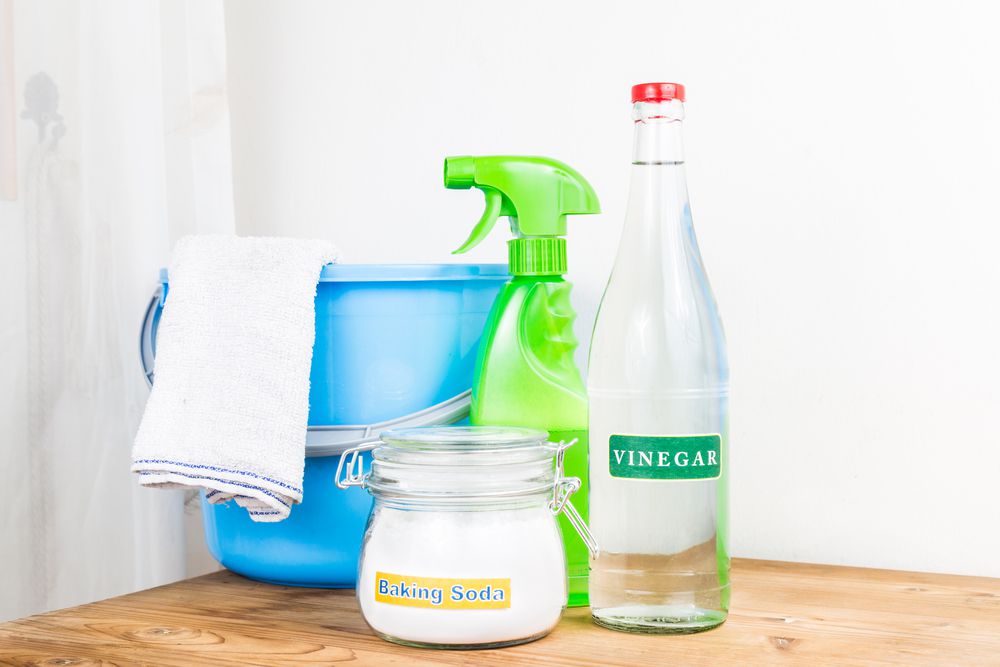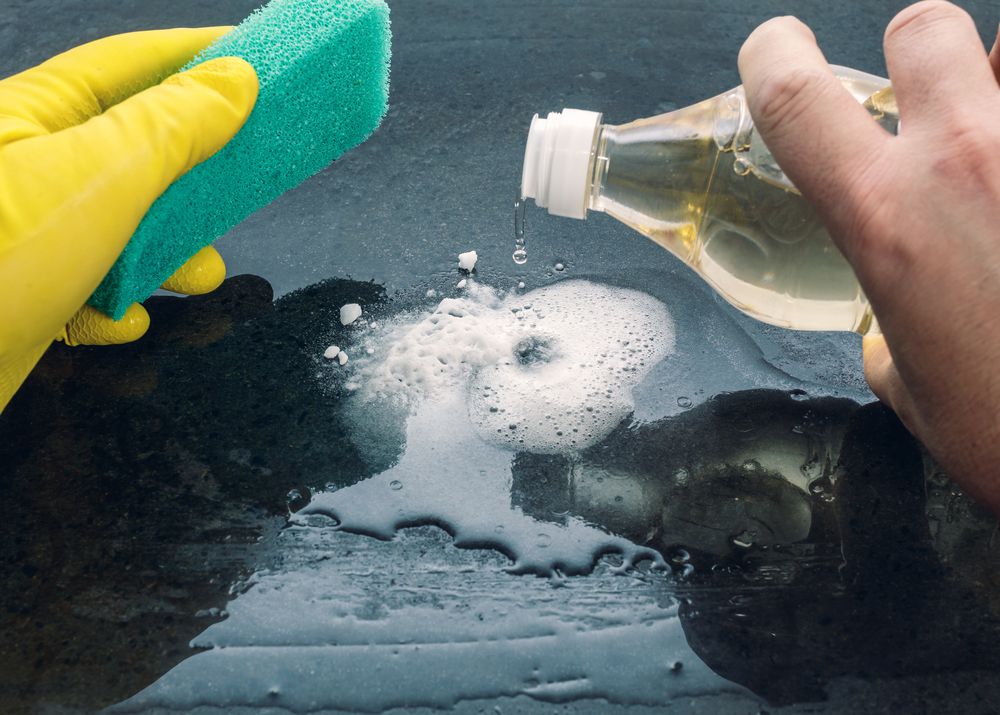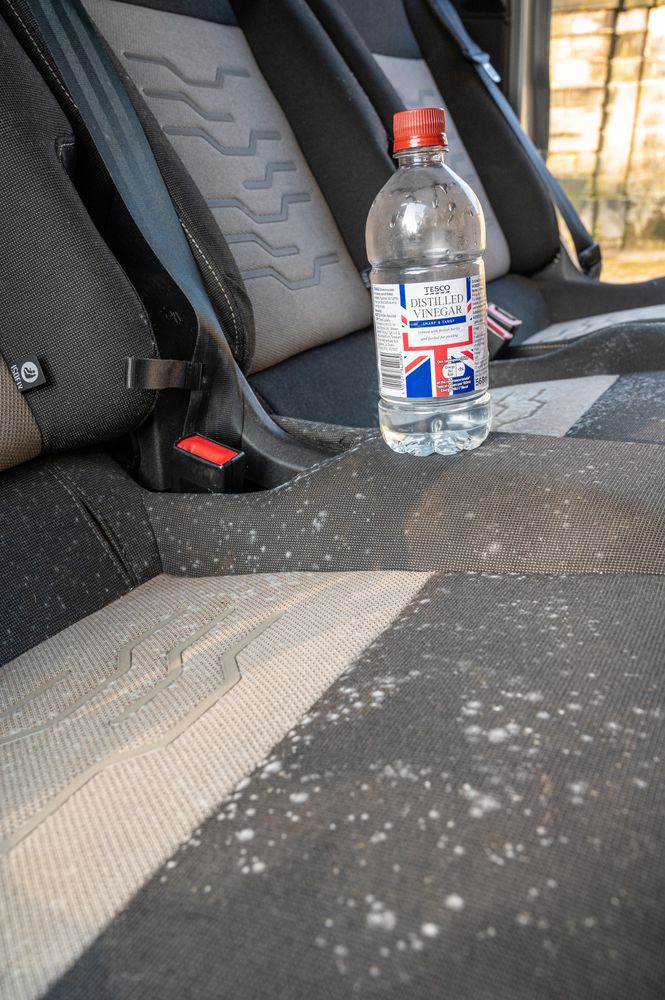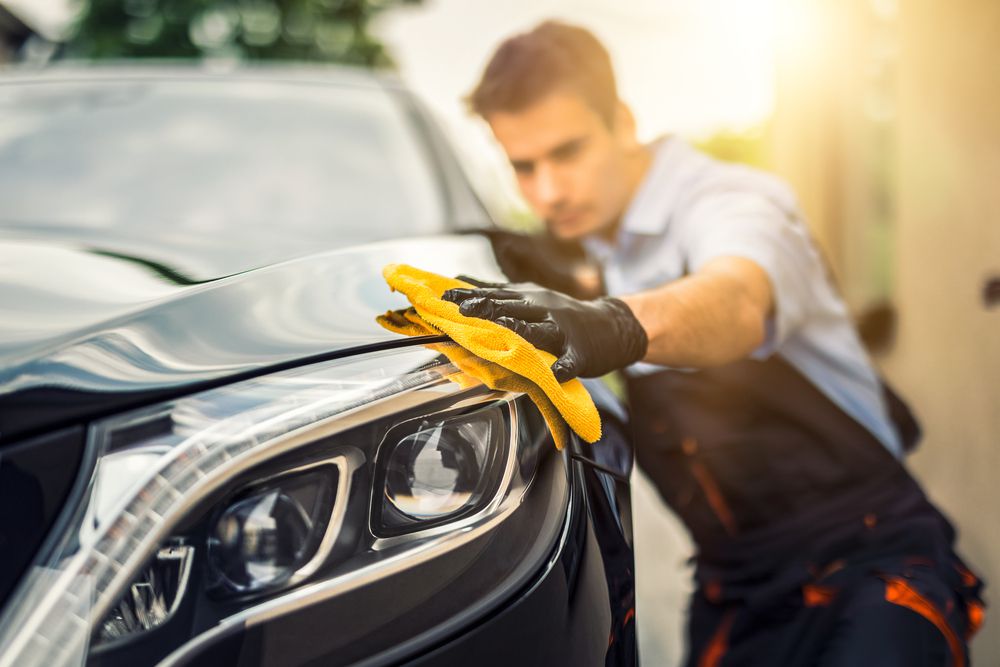Vinegar is a helpful household cleaning product for various purposes, but
people often wonder whether vinegar's cleaning properties apply to cars.
For example, can you use vinegar on a car? Is it safe for car paint, and is
vinegar bad for your car?
You should avoid using white vinegar on car paint due to its acidity.
However, if you want to try vinegar, dilute it with water and test the
solution on a small, inconspicuous spot to check if the vinegar
solution damages the car's paint.
There are several reasons why it may be unwise to use vinegar on car paint,
and the rest of this article will discuss why you're generally better off
using a product designed for cars.
 Vinegar is commonly used as a cleaning product.
Vinegar is commonly used as a cleaning product.
Does Vinegar Ruin Paint on Cars?
Vinegar has a lot of uses for cleaning household surfaces, but as it turns
out, it's the acidity of the vinegar that poses a risk to your car.
Vinegar is highly acidic, with a ph of 2.5.
If vinegar is applied to a car's paint at full strength, it could damage
its clear coat and paint layers.
These effects will be worsened by prolonged exposure to the sun, which
accelerates the chemical process.
You can minimize the possibility of damaged paint by diluting the vinegar
into a solution and using baking soda to neutralize the vinegar after
cleaning your car.
Can I Wash My Car with Vinegar?
There are some instances where vinegar may be the only way to remove a
substance from your car.
Removing fresh tree sap, stubborn dirt particles, and grease oil are three
examples where vinegar may even work better than commercial car cleaning
products available at a hardware store.
Using vinegar on car windows is less risky than on a car's paint.
 Using vinegar to clean a car hood.
Using vinegar to clean a car hood.
How to Use Vinegar
The best use of vinegar is on your windows and for tackling hard-to-remove
substances like road tar, bird droppings, and tree sap.
To use vinegar to wash your car:
-
Make a DIY vinegar solution: mix vinegar and warm water
at a ratio of 3 parts water to 1 part vinegar.
-
Test the solution on a small area: test the solution on
a small area of the stain before trying to remove the entire stain.
-
Apply the solution to the entire stain: After testing a
small area, you can apply the solution to the whole stain and use a wash
mitt to rub the stain away. You may have to apply and wipe multiple times
to remove the substance layer by layer until it is completely removed.
-
Rinse: Use water to rinse the vinegar away as soon as
possible. You can also create a baking soda solution to neutralize the
acidic effects of vinegar.
You should avoid washing your car with pure vinegar.
Instead, if you have an especially stubborn stain, you can try increasing
the strength of the vinegar solution. For example, try a 2:1 water/vinegar
solution instead of a 3:1 water/vinegar solution.
Another thing to keep in mind is that direct sunlight will accelerate any
chemical reaction which may take place. For this reason, it is important to
rinse the vinegar solution as soon as possible, lest it reacts with the
car's clear coat or paint.
 Vinegar is useful for cleaning mold in a car interior.
Vinegar is useful for cleaning mold in a car interior.
Does Vinegar Eat Clear Coat?
The clear coat is the final coat of paint or resin applied on top of the
car's colored base coats of paint.
The clear coat is transparent and glossy to enhance the appearance of the
car's base coat and give it a shine.
Vinegar could react with the car's clear coat, so it's important not to use
pure vinegar, and if you apply a vinegar solution, rinse it off the car as
soon as possible.
Abrasive materials like paper towels or cloth not designed for washing a
car can also damage the clear coat.
You can avoid scratching the car's clear coat using a microfiber cloth.
Will Vinegar Damage Painted Surfaces?
Vinegar is a liquid containing acetic acid, the same acidic component found
in foods like mustard.
Acid, by nature, will peel paint, so you should never use pure vinegar when
trying to clean car surfaces.
That said, mixed as a solution, vinegar is generally safe on painted
surfaces if used sparingly and rinsed off with water immediately.
It is generally advisable to use a commercial cleaning product formulated
for your exact use case before resorting to trying vinegar.
 Removing car wax with vinegar.
Removing car wax with vinegar.
Will Vinegar Take Off Car Wax?
Yes, vinegar will take car wax off. Car wax is applied over the car's
clearcoat to protect it from harmful UV rays, road chemicals, and light
scratches.
Although plenty of commercial products are formulated to remove car wax,
you can use a vinegar solution as an alternative.
Vinegar Alternatives to Consider
If you're in a pinch and don't have any vinegar or car soap, there are a
few other alternatives to consider to wash your car.
Perhaps surprisingly, shampoo is a very effective car wash alternative if
you don't have car wash soap.
To use shampoo as a car soap, lather it with water like you would if you
were washing your hair and apply it liberally to your car.
Make sure to rinse the shampoo off your car as soon as possible to avoid
soap stains that may lead to damaging your clear coat.
Baking soda is another great alternative to use in place of car wash soap.
You can mix the baking soda by itself with water, or you can also add some
shampoo to improve the cleaning capabilities of the solution even more.
However, you should not use dish soap to wash your car since it can damage
your car's clear coat and paint due to its degreaser.
Final Thoughts
If mixed with water to create a solution, vinegar is safe for car paint as
long as it is rinsed off completely. Often a vinegar water solution will
outperform commercial products to remove tough stains left by substances
like tree sap and bird poop. An ideal ratio for the cleaning solution is 1
part vinegar for every 3 parts water.
Other household items you can use with water-based solutions to wash a car
are shampoo and baking soda.